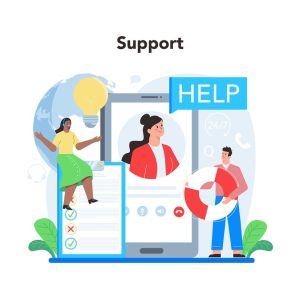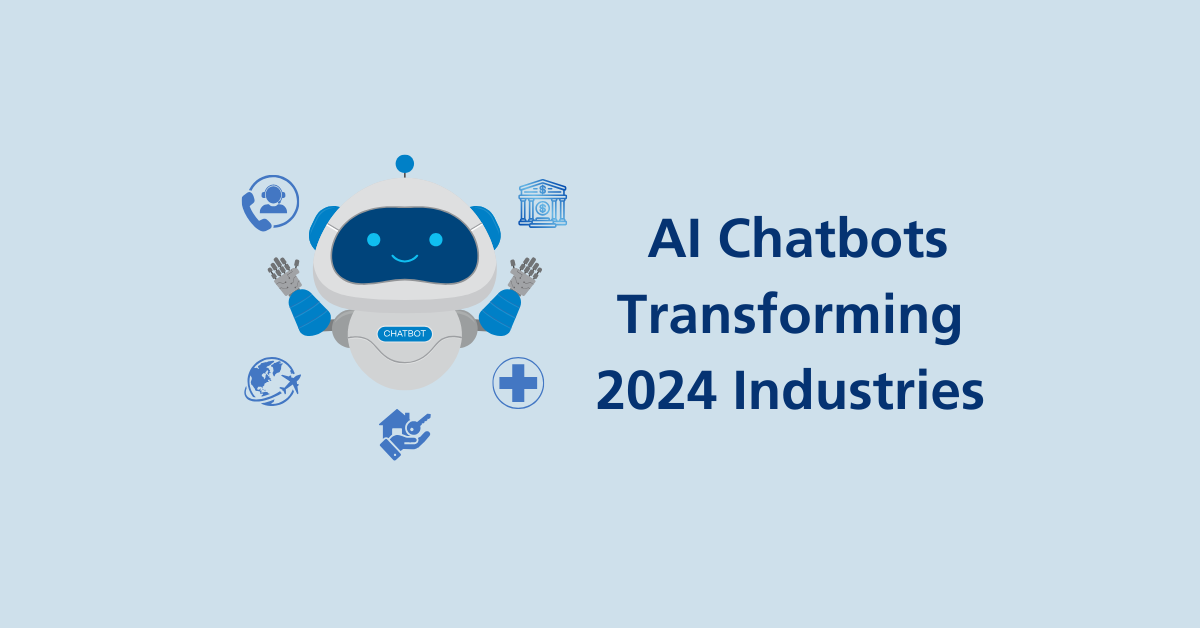In 2024, AI chatbots are completely changing the way businesses operate and engage with their customers. These smart solutions streamline operations, improve customer experiences and accelerate growth in industries. AI chatbots are becoming essential tools for companies looking to remain competitive because of their capacity to deliver immediate responses, personalized interactions, and low-cost scalability.
However, many firms continue to face issues like increased customer expectations, shortages of resources, and a demand for fast, 24/7 assistance. AI chatbots solve these pain areas by providing real solutions that benefit both businesses and customers.
AI Chatbots: Transforming Interactions
AI chatbots use advanced technology such as Natural Language Processing (NLP) and machine learning to provide efficient and human-like interactions. NLP allows chatbots to understand language, context, and intent so that their responses are relevant and accurate. Chatbots use machine learning to learn from previous interactions which allows them to predict needs of users and change their response accordingly.
These systems use algorithms to replicate the way humans process information. This allows chatbots to perform complicated tasks such as processing multiple requests seamlessly. AI chatbots connect with business systems via APIs (Application Programming Interfaces), helping them to access data, automate operations, and provide immediate answers. They can integrate with CRM technologies to personalize interactions or streamline processes.
The combination of technological innovation and practical application is changing interactions, allowing organizations to provide faster, smarter, and more customized services in industries.
Impact of Chatbots on Different Industries
Chatbots are growing from experimental tools to valuable assets across various industries. They let customers and businesses communicate more effectively and improve customer experience. Let’s look at their significant impact in key sectors:
-
Healthcare

Chatbots serve as virtual assistants for symptom checks, appointment scheduling, and prescriptions reminders.
Benefits:
- 24/7 Availability: They ensure that patients have access to medical information and support at all times, which is especially important in emergency situations or for individuals in remote areas.
- Streamlined Operations: Automating appointment bookings and addressing common queries reduces administrative workload.
- Improved patient engagement: Regular medication reminders and follow-up messages help patients stick to their treatment schedules.
Impact:
- Increasing accessibility to healthcare services and improving patient outcomes.
- Cost savings are achieved by reducing repetitive processes and improving allocation of resources.
-
E-Commerce

AI Chatbots are used in e-commerce to provide customized shopping experiences, track orders, and answer customer questions about products and services.
Benefits:
- Personalized Recommendations: By monitoring user data, chatbots recommend products based on specific preferences, increasing the possibility of purchase.
- Efficient Customer Support: Provide immediate replies to issues like shipping, returns, and discounts which deliver an engaging purchasing experience.
- Increased Engagement: Chatbots answer client problems during the purchasing process, which generally results in increased conversion rates.
Impact:
- Increased sales through improved user engagement.
- Cart abandonment is reduced due to real-time service, enhancing overall retention of customers.
-
Banking

Chatbots are used to check account balances, detect fraud, provide transaction alerts, and manage accounts.
Benefits:
- Enhanced Security: Chatbots alert customers to uncertain behaviours, and allow for quick replies to suspected frauds.
- Convenient Banking: Through simple chatbot conversations, customers can complete routine transactions such as bill payment and fund transfer.
- Financial guidance: Offering customized advice based on consumers’ spending habits allows them to better manage their finances.
Impact:
- Proactively addresses fraud concerns to increase client trust.
- Banks can save significant amount by automating high-frequency inquiries
-
Travel & Tourism

Chatbots play an important role in travel and tourism, including booking administration, route planning, real-time updates, and customer support.
Benefits:
- Bookings: Bots make the booking process easier by suggesting flights, hotels, or packages that match customers’ tastes.
- Real-Time Updates: They provide quick notifications about airline delays, cancellations, and schedules changes, which improves the travel experience.
- Localized Assistance: Multilingual support makes sure customers from all backgrounds get the assistance they require while going abroad.
Impact:
- Increased customer satisfaction through customized and immediate assistance.
- Chatbots increase profit by promoting add-on services such as guided tours, premium seating, and hotel upgrades.
-
Real estate

AI chatbots act as digital assistants, displaying property listings, scheduling virtual tours, generating leads, and answering questions.
Benefits:
- Lead Qualification: By interacting with potential buyers, chatbots detect genuine leads and connect them with real estate professionals.
- Accessible Listings: Users can get on-demand information about homes, such as prices, availability, and amenities, through accessible listings.
- Interactive Customer Service: Chatbots can answer frequent questions regarding financing, communities, and legal procedures, delivering essential information to customers.
Impact:
- Improved customer satisfaction by providing fast replies to client inquiries.
- Chatbots handle regular conversations, allowing agents to focus on closing deals which increases their efficiency.
-
Customer Support

Chatbots are commonly used in customer support to answer questions, resolve concerns, handle issues, and collect feedback.
Benefits:
- Instant Responses: Customers receive immediate assistance without waiting in large queues for human workers.
- Consistency: Chatbots provide consistent messaging and accurate responses, which improves brand reliability.
- Proactive Engagement: They can contact clients with appropriate offers, updates, or reminders, building stronger connections.
Impact:
- Improved client satisfaction through quick and consistent help.
- Businesses save money because chatbots can manage high numbers of questions without the need for extra employees.
Benefits of Chatbots for Businesses
Chatbots make business interactions easier by providing continuous availability, customized customer experiences, and effective scalability and help businesses to streamline processes.
- 24/7 Customer support
Chatbots are available 24 hours everyday which allow businesses to give customers support at any time. This makes sure that no query is left unresolved which boosts customer loyalty and satisfaction.
- Sales & Lead Generation
Chatbots acts as virtual sales representatives, assisting firms in qualifying leads by collecting required information about consumers. They help customers throughout the sales process, recommend relevant products, and increase conversion rates by providing a personalized shopping experience.
- Multilingual Support
Chatbots can communicate in multiple languages, helping businesses to interact with customers from different countries. This ability allows global businesses to strengthen relationships with diverse audiences.
- Omnichannel Integration
Chatbots work effortlessly with multiple platforms, including social media, websites, CRM systems, and messaging apps such as WhatsApp or Messenger. This provides a uniform customer experience among all communication platforms.
- Scalability
Chatbots can conduct thousands of conversations at once without compromising efficiency. As businesses grow, they can simply handle more customer queries, providing seamless operations during times of high traffic.
- Improved customer engagement
Chatbots provide interesting conversations that are customized according to the demands of customers in real time. They improve the overall experience by providing recommendations, resolving concerns quickly, and increasing loyalty.
Challenges and Considerations of Implementing Chatbots
Implementing chatbots can impact business processes, but certain challenges and factors must be addressed for successful implementation:
- System Integration.
Chatbots must work seamlessly with existing systems, such as CRM platforms, e-commerce solutions, and databases. Poor integration may interrupt workflows and reduce their effectiveness, requiring proper technological preparation.
- Data Privacy and Security.
Handling confidential customer information needs strong encryption, secure storage, and adherence to privacy regulations such as GDPR or CCPA. Regular audits help to reduce risks and assure compliance.
- Understanding Complex Queries.
Complex or multifaceted inquiries are often challenging for chatbots to answer. Advanced natural language processing (NLP) and regular updates are required to successfully handle a wide range of conversation problems.
- Development Costs
Building feature-rich, AI-powered chatbots may be expensive, particularly for customized solutions. Businesses must compare the return on investment (ROI) to the initial costs.
- Cultural and language challenges.
Chatbots can have problems in understanding regional voices, informal speech , and cultural differences. Localized training data and continuous learning methods contribute to better interactions.
- Addressing Bias in AI.
Chatbots can acquire biases from training datasets, resulting in inappropriate or wrong responses. Regular assessments and multiple inputs are essential for reducing bias.
Future Trends in Chatbot Technology
Advancements in AI, speech recognition and personalization will influence the future of chatbot technology. Generative AI offers human-like, context-aware interactions, while voice-enabled bots provide effortless interaction via assistants. Omnichannel integration offers consistent experiences among platforms, while language capabilities respond to a worldwide audience.
Industry-specific chatbots answer particular business needs, while improved security measures maintain data privacy. Low-code platforms make development easier, and IoT connectivity allows automation in tasks such as smart device monitoring. These advancements are making chatbots smarter, more adaptable, and more user-centric.
Conclusion
AI chatbots are changing business processes and customer service by offering 24-hour support, customized experiences, and faster procedures. Their influence helps businesses like healthcare, e-commerce, finance, tourism, and real estate by cutting expenses, increasing efficiency, and improving customer satisfaction. Effective implementation involves handling challenges such as system integration, data protection, and regular updates to meet changing demands of customers.
Future developments in AI, speech recognition, and cross-platform compatibility provide even more promise. These advancements will make chatbots smarter, more adaptable, and more equipped to serve a global audience. Adopting these technologies allows businesses to provide excellent service and keep a competitive edge in a rapidly changing industry.
FAQ’s
- Which industries benefit most from AI chatbots?
AI chatbots provide significant benefits to businesses like healthcare, e-commerce, finance, travel and tourism, real estate, and customer service. They improve operations, increase customer satisfaction, and lower expenses.
- What future trends will impact chatbot technology?
Future advancements will include generative AI for more human-like interactions, voice-enabled chatbots, improved security, omnichannel integration, and specialized industry-specific solutions. These developments will make chatbots more intelligent, user-centric, and globally flexible.
- What role do chatbots play in e-commerce?
Chatbots improve e-commerce through delivering personalized shopping experiences, answering product questions, tracking orders, and making recommendations. They increase user engagement and lower cart abandonment rates.
- What impact do chatbots have on cost efficiency?
Chatbots perform repeated operations, reducing the need for human involvement. This allows organizations to save operating expenses while reassigning human resources to more difficult tasks.
- How do AI chatbots use machine learning?
Chatbots use machine learning to analyze previous interactions, forecast customer demands, and improve their replies over time. As a result, they can comprehend user intent more accurately and efficiently.
- Why are chatbots useful for customer support?
Chatbots answer consistently and quickly to customer inquiries, collect feedback, and manage a large volume of requests without requiring additional staff. They maintain brand reliability and increase customer trust.


Leave a Reply